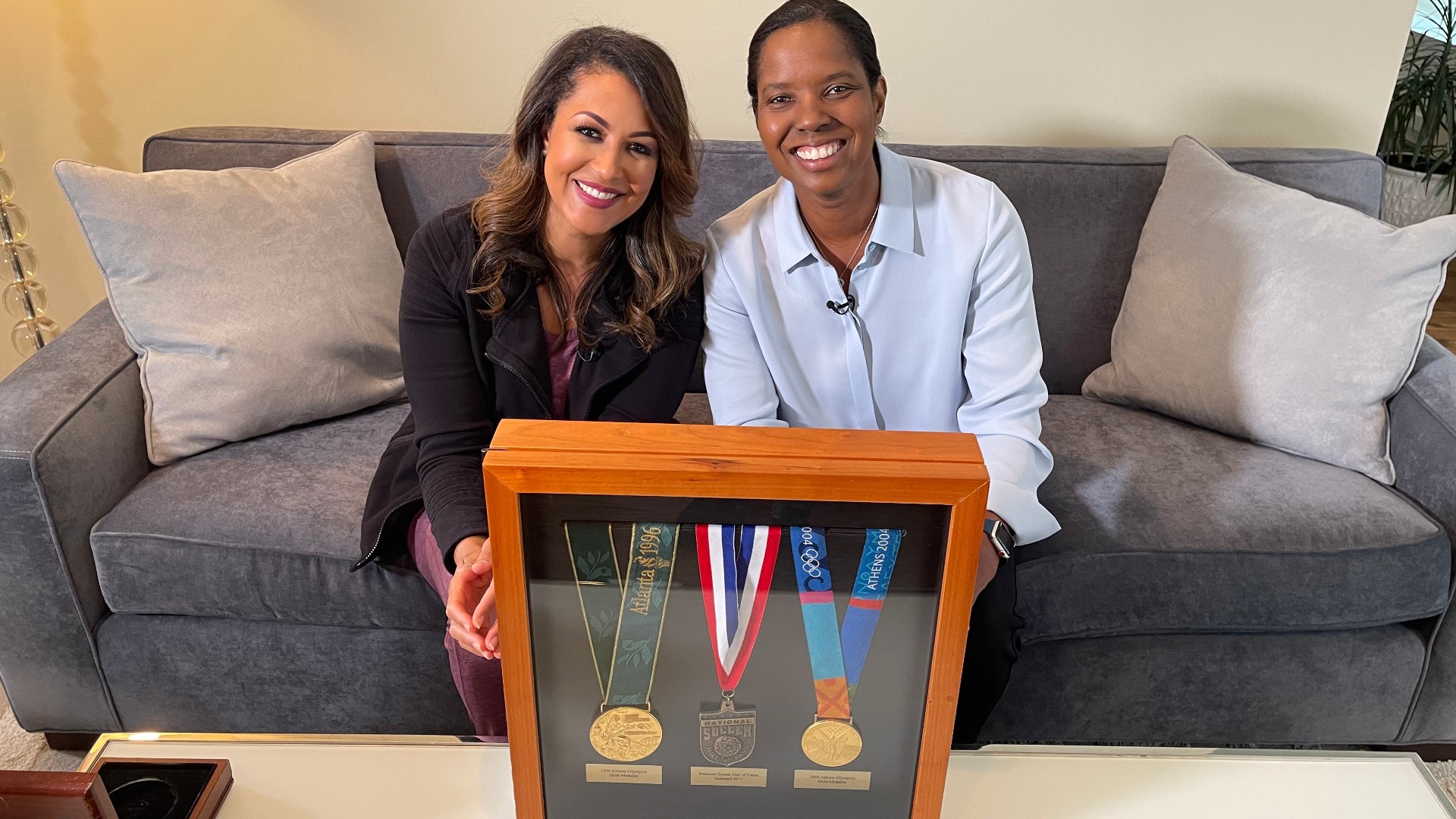ALEXANDRIA, Va. — On a soccer field, the goalkeeper is the last line of defense. Their skills can literally make or break the game. Legendary soccer goalie Briana Scurry spent decades defying gravity with her athleticism when it mattered most.
She never hid during a game - or in life - who she truly was.
During Pride month, and 50 years after Title IX, this trailblazer in women’s sports is opening up about standing in her truth and the arc of her greatest save.
“I am 50 years old and spent almost half of those years guarding soccer balls all over the world," Scurry said. "It is a job that brought me a measure of fame if not fortune along with some of the greatest thrills of my life and the greatest pain too.”
Scurry is finally ready to tell that story.
“Before, I wasn’t sure if I was ready to go back in those rooms of my life that are a little bit shady or a little bit dark, or I haven’t visited in a long time because of the pain in there,” she said.
Briana grew up in Minnesota and flourished in spaces where she was often the only person who looked like her in classes and on the field.
“I feel like I was just meant to be there, whether it was on the national team, or in college playing a sport that’s predominately white and suburban," Scurry said.
She left it all on the field, in goal and as the first out gay player in women’s soccer.
“I wanted to be authentically who I am, and I didn’t feel like I needed to hide or ask permission from anyone to be me," Scurry said. "I think I’ve been really lucky. But I know a lot of people who haven’t been.”
The goalie's career spanned the globe. And in 1996, she received one of her long-held dreams: to earn Olympic gold. It was a feeling of euphoria, she said.
“Think of the most amazing moment you could possibly have in your life and multiply it by 1000," Scurry said. "That’s what it feels like, I mean, the pageantry and the drama.”
There would be more medals and more accolades, like when the U.S. team won the 1999 World Cup 5-4 on a penalty shootout. Scurry's leap of faith saved the day.
“That stretch, I actually tore a little muscle off the bone,” Scurry recalled as she showed off the save, that lead to a World Cup victory.
Scurry and her teammates were becoming household names. But as the story of this legendary team was told, there were differences.
Other players were centered as the ones who made the difference. And other players were the ones recognized with endorsements and more. Years later, Scurry is reflecting on it all.
“I realized, okay, maybe it’s not the goalkeeper position," she said. "It wasn’t until far later when I realized, maybe it was my color. Maybe it was the way I looked or the fact that I was out that hindered opportunity for me.”
Then, came a curveball in 2010. A knee to the head would end her career.
“I was very slow to stand up and the referee’s like ‘come on, keep this going.’ So I stood up and I knew something was wrong,” Scurry said.
It was a severe head trauma that required surgery. But the player who represented her country 172 times and won a World Cup and two Olympic gold medals says she had to fight an American company to get the care she needed.
“I’m still upset about it because there are certain things that are just not right," she said.
Scurry also says she had to fight her old team to get medical treatment. And, because the women weren’t paid as well as the men’s soccer team, she was deeply in debt.
“I had to decide whether to pawn my medals," Scurry recalls. "And to this day it's a very painful thing to think about.”
She pawned those medals and began to spiral even further into despair.
The traumatic injury and the fight to rebuild had brought her to the brink of nearly taking her own life.
“If it wasn’t for my mom being alive at the time and the thought of her being told that her baby was gone, that’s what kept me from doing it,” Scurry shared.
While Scurry lost both of her parents, life gave her something new.
Love.
She met and married her wife Chyrssa and gained two bonus children. And, she reclaimed these medals - the ones she pawned years ago.
“My greatest save was actually me,” Scurry proclaimed. “I have a home and a life that is above and beyond anything I could have possibly expected. And so I am grateful for every day, for everything I have.”
There’s one more measure of Scurry's impact on and off the field. Equal pay will finally become a reality for women’s soccer players.
“My job was to put the road down. And then their job is to run on it, drive on it, fly on, however they’re gonna do it,” Scurry said. “My legacy is rather bright. And, I’m very proud of it.”
Another thing Scurry is proud of is how her efforts to be a game-changer are now showcased in the sports exhibit at the National Museum of African American History and Culture.
She hopes to expand on that story when she embarks on a book tour to talk about her greatest save. She says her only regret now is that her biggest inspiration - her parents - aren’t here to see this part of her journey.
In July, a new documentary called “The Only” will premier on Paramount Plus about her impact. It’s been two years in the making.

